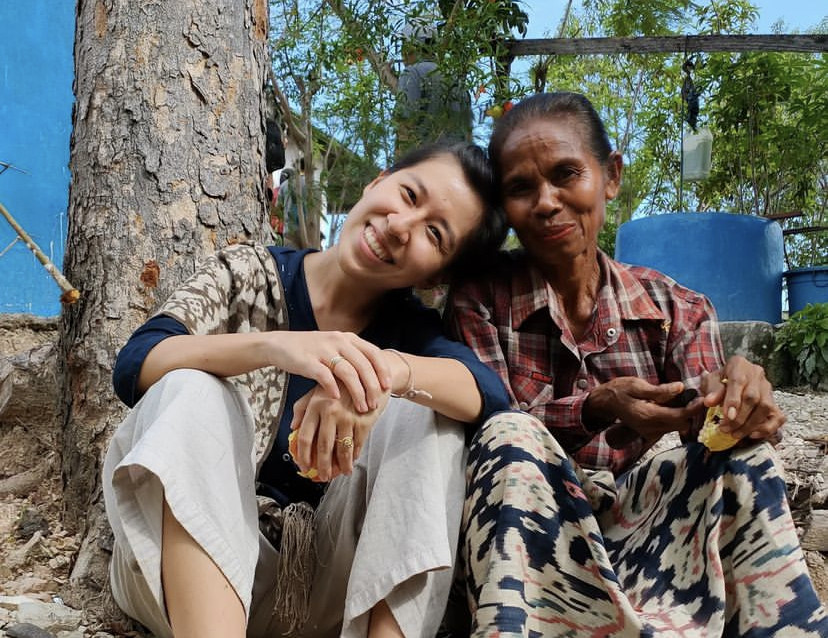Popular Reads
Top Results
Can't find what you're looking for?
View all search resultsPopular Reads
Top Results
Can't find what you're looking for?
View all search resultsWhat I’ve learned: Denica Riadini-Flesch, founder and CEO of SukkhaCitta
Change text size
Gift Premium Articles
to Anyone
‘What I’ve Learned’ is a column that presents candid interviews with policymakers, artists, activists and businesspeople on facing challenges and making a difference.
SukkhaCitta goes mud deep to stitch a positive impact into what you wear. The farm-to-closet social enterprise is putting women back in the driver’s seat to change their own lives. Not through aid, but fair work.
Denica Riadini-Flesch, the founder, defines herself as a nerd who cares, and this nerd cares a lot. But she cares about a lot of things most of us take for granted, like a genuine connection to a community, the Earth and the people around us. In a world where most of us are driven by capitalism and obsessed with market share and growth, Denica chooses to focus on what she can contribute to the world, how she can be a part of something bigger than herself.
***
We work with villages, not factories. We started out in 2016 with three women, and now our work provides income for almost 1,500 across the archipelago.
From the outside it looks like we just sell clothes. But we receive so many messages and emails from people who are telling us that just wearing the clothes has changed their perspective on life. Starting to think about what gives them meaning and how their work can advance that: A global movement of reconnecting.
Almost everything we buy seems to be marketed as ethical and sustainable. But in reality, what does it really mean? I feel that customers deserve transparency. They deserve to know where their money goes and where their clothes come from. So that they can know exactly what goes on behind their purchase and ensure that it aligns with their values.
Ensuring those who make your clothes earn a livable wage. That’s why we work directly with the most vulnerable women in the global fashion industry: Mothers, or ibu-ibu, working from home. Women who’ve been invisible for too long, who are keeping our heritage alive, but without access are trapped in poverty.
We don’t do fashion seasons or trends. Rather, we focus on building a farm-to-closet ecosystem where you can trace exactly who made your clothes, and what the impact is on her family. Proceeds fund Rumah SukkhaCitta, our craft schools where craftswomen learn not only about the crafts, but also business skills.
By providing access to education, we address the biggest challenge faced by the informal handmade industry: That artisans don’t know how to calculate a fair price for their work. That’s when we started training our craftswomen to measure how long it takes them to finish one fabric and how much they should be getting for their handiwork. This way, we can ensure they’re earning well above the local minimum wage, returning visibility and value back to their hands.
Ensuring the opportunities we’re creating don’t come at the expense of our planet. That’s why everything we make is dyed with plant-based dyes. By exclusively growing and working with our own natural dyes, we ensure that our colorful clothes no longer pollute our rivers.
But as a nerd, I like looking for problems. Two years ago, we started working on a different issue: The traceability of our raw materials. Right now, over 99 percent of cotton in Indonesia is imported. Grown in massive monocultures with so many chemicals, cotton is seen as the dirtiest crop in the world.
Running SukkhaCitta is a journey of relearning and reconnecting. In fact, the way our ancestors grew cotton was completely different. So we started tracing the origin of a single thread, which led us to meet some of Indonesia’s last cotton farmers. Together with them, we went on a journey of remembering. Of using herbs and spices to keep bugs away. Of making compost as a natural fertilizer. And to grow it with 20, 30 different crops, like a forest.
Our ancestors called it tumpang sari, or regenerative farming. Today, it’s been found to be one of the best nature-based climate solutions right under our feet.
The best thing is that this is not some fancy new technology. It is proven local wisdom that has been practiced here in Indonesia for generations. All we need to do is reconnect and remember.
As an economist I was trained with these conventional notions that we want economic growth, technology, but being in the field I realized that all these beliefs about technology don't change anything for the lives of these women who are in villages. Every year we want to grow. To have more is considered progress, but is it really?
Having the chance to re-learn what true sustainable development is from these indigenous communities has changed my perspective. They have taught me what it means to have enough. To build reciprocity, to not only take, but to give back, in everything we do. That bigger is not always better, especially when we never ask what the true cost is of our current way of life.
Through SukkhaCitta, we are trying to connect you with the whole story behind something as simple as clothes, what is happening behind the clothes, so you can make your own decision. Through a simple choice like the shirt you choose to wear today, you can change the lives of women and be part of the climate solution.
You don’t have to choose between impact and chasing success. You can actually combine them. As we enter the time where we normally make plans for the next year, I encourage you to take time and listen. To define what true success really means to you. Not only what we want to achieve, but what legacy we want to leave behind.











